-
 Bitcoin
Bitcoin $95,748.7916
-0.94% -
 Ethereum
Ethereum $2,807.4459
1.44% -
 XRP
XRP $2.5695
-0.43% -
 Tether USDt
Tether USDt $1.0001
0.00% -
 BNB
BNB $654.2450
-2.35% -
 Solana
Solana $167.9195
-2.80% -
 USDC
USDC $0.9999
-0.03% -
 Dogecoin
Dogecoin $0.2422
-1.89% -
 Cardano
Cardano $0.7684
-1.29% -
 TRON
TRON $0.2453
3.65% -
 Chainlink
Chainlink $17.5673
-1.33% -
 Sui
Sui $3.3326
-2.03% -
 Avalanche
Avalanche $24.7190
-4.62% -
 Stellar
Stellar $0.3318
-1.05% -
 Litecoin
Litecoin $128.0532
1.05% -
 Toncoin
Toncoin $3.7677
1.74% -
 Shiba Inu
Shiba Inu $0.0...01543
-1.84% -
 UNUS SED LEO
UNUS SED LEO $9.7641
0.33% -
 Hedera
Hedera $0.2096
-3.64% -
 MANTRA
MANTRA $8.4884
12.24% -
 Hyperliquid
Hyperliquid $23.3170
-6.26% -
 Polkadot
Polkadot $4.9264
-2.76% -
 Bitcoin Cash
Bitcoin Cash $325.2074
1.20% -
 Bitget Token
Bitget Token $5.0040
1.43% -
 Ethena USDe
Ethena USDe $1.0003
0.09% -
 Uniswap
Uniswap $8.9837
-0.32% -
 Dai
Dai $1.0000
-0.02% -
 Monero
Monero $235.0623
0.07% -
 NEAR Protocol
NEAR Protocol $3.4423
-0.96% -
 Pepe
Pepe $0.0...09308
-3.69%
One article explains in detail all the ways to obtain Metadium (META) coins
To obtain Metadium (META) coins, one can purchase them on centralized exchanges, trade them on decentralized exchanges, stake them in non-custodial wallets, participate in airdrops and bounties, use the Metadium wallet, or contribute to the Metadium ecosystem.
Dec 31, 2024 at 04:37 am

How to Obtain Metadium (META) Coins: A Comprehensive Guide
Metadium (META) is a cryptocurrency that powers the Metadium blockchain, a platform for developing and deploying decentralized applications (dApps). META can be obtained through various methods, each with its own advantages and drawbacks. This guide will explore all the available ways to acquire META coins, addressing potential questions and providing detailed instructions.
Key Points:
- Buying on Centralized Exchanges: Acquiring META from established platforms like Binance, Huobi, and KuCoin offers convenience and liquidity.
- Decentralized Exchanges (DEXs): Trading META on DEXs, such as Uniswap and Sushiswap, allows for direct transactions without intermediaries.
- Staking: Holding META in a non-custodial wallet enables staking, where users earn rewards for contributing to the network's security.
- Participating in Airdrops and Bounties: Airdrops and bounties involve distributing free META coins to promote the project or reward community contributions.
- Using the Metadium Wallet: The Metadium wallet provides a secure storage option as well as the ability to earn META through its staking program.
- Participating in the Metadium Ecosystem: Contributing to the Metadium ecosystem, such as developing dApps or providing liquidity, may qualify for rewards in META.
Buying on Centralized Exchanges:
- Register an account: Create an account on a centralized exchange that supports META trading, such as Binance or KuCoin.
- Deposit funds: Transfer funds from your bank account or another cryptocurrency wallet into your exchange account.
- Find the META trading pair: Locate the META trading pair (e.g., META/USDT or META/BTC) on the exchange's interface.
- Place a buy order: Specify the amount of META you wish to purchase and the price you're willing to pay.
- Confirm your transaction: Review the order details and confirm the purchase.
- Withdrawal to a non-custodial wallet: Once the transaction is complete, you may withdraw your META coins to a non-custodial wallet for enhanced security.
Trading on Decentralized Exchanges (DEXs):
- Connect to a DEX: Choose a DEX that supports META trading, such as Uniswap or Sushiswap, and connect your MetaMask wallet.
- Set up the swap transaction: Select the META trading pair and specify the amount of META you wish to purchase.
- Approve the transaction: Your wallet will prompt you to approve the transaction, which may involve paying a gas fee.
- Complete the swap: Once the transaction is approved, the META coins will be automatically swapped into your wallet.
Staking:
- Acquire a non-custodial wallet: Obtain a non-custodial wallet that supports META staking, such as the Metadium wallet or Ledger hardware wallet.
- Transfer META to your wallet: Send your META coins from an exchange or DEX to your non-custodial wallet.
- Stake your META: Within your wallet's interface, navigate to the staking section and select the amount of META you wish to stake.
- Receive staking rewards: Your wallet will automatically earn staking rewards, which are typically paid out in the form of additional META coins.
Participating in Airdrops and Bounties:
- Identify potential airdrops and bounties: Monitor cryptocurrency news and forums to learn about upcoming airdrops and bounties related to META.
- Meet the eligibility requirements: Each airdrop or bounty may have specific eligibility requirements, such as following social media accounts or completing tasks.
- Provide the necessary information: Typically, you will need to provide your Metadium wallet address or other pertinent details to claim the rewards.
Using the Metadium Wallet:
- Install and create a Metadium wallet: Download the Metadium wallet app or software for your device and create a new wallet.
- Transfer META to your wallet: Send your META coins from an exchange or DEX to your Metadium wallet.
- Stake your META: Within the Metadium wallet's interface, select the staking option and indicate the amount of META you wish to stake.
- Earn staking rewards: You will automatically earn staking rewards, which are credited directly to your Metadium wallet.
Participating in the Metadium Ecosystem:
- Develop dApps on the Metadium blockchain: Contribute to the Metadium ecosystem by developing and deploying dApps on the platform.
- Provide liquidity: Become a liquidity provider on decentralized exchanges or other platforms within the Metadium ecosystem.
- Participate in governance: Take part in Metadium governance by voting on proposals and influencing the direction of the project.
FAQs:
- What is the current price of META?
The real-time price of META can vary significantly, so it's best to check the latest market data from reputable sources. - What is the total supply of META?
The total supply of META is capped at 10 billion coins. - What are the fees associated with trading META?
Fees for trading META vary depending on the platform and transaction type. Centralized exchanges generally charge trading fees, while decentralized exchanges may require gas fees for transactions. - Is it possible to mine META?
META cannot be mined, as it uses a proof-of-stake consensus mechanism rather than a proof-of-work algorithm.
Disclaimer:info@kdj.com
The information provided is not trading advice. kdj.com does not assume any responsibility for any investments made based on the information provided in this article. Cryptocurrencies are highly volatile and it is highly recommended that you invest with caution after thorough research!
If you believe that the content used on this website infringes your copyright, please contact us immediately (info@kdj.com) and we will delete it promptly.
- What is BNB?
- 2025-02-24 05:00:27
- Bitcoin (BTC) Capitulation Event Precedes Short-Term Price Recoveries
- 2025-02-24 05:00:27
- Dawgz AI: The Meme Coin With a Difference That Could Be the Next Breakout Success
- 2025-02-24 05:00:27
- Top 5 ICOs to Invest in Right Now to Get Ahead of the Market
- 2025-02-24 05:00:27
- Bybit Freezes $42.89M in Illicit Funds with Industry Partners, Halting Crypto Fraud. Swift Action Also Blocks $26M Meme Token Laundering Scheme.
- 2025-02-24 05:00:27
- Is Grayscale’s ETF Transformation the Game-Changer Cryptocurrency Needs?
- 2025-02-24 05:00:27
Related knowledge
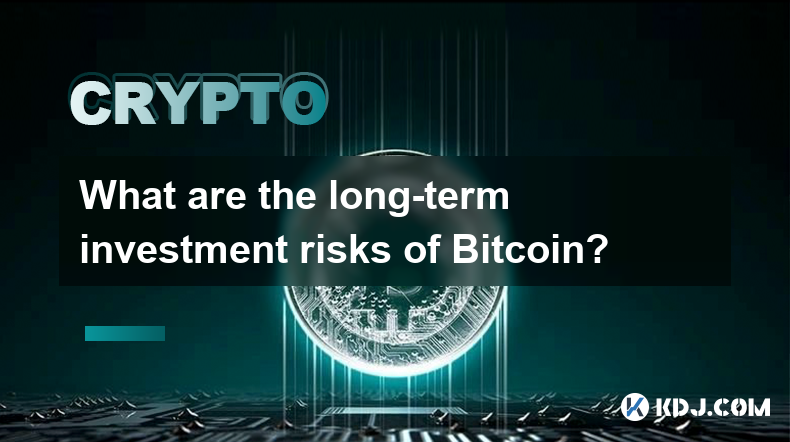
What are the long-term investment risks of Bitcoin?
Feb 22,2025 at 05:30pm
Key PointsVolatility and price fluctuationsRegulatory uncertaintySecurity risksCompetition from altcoinsMarket manipulation and scamsTransaction feesEnvironmental concernsLong-Term Investment Risks of BitcoinVolatility and Price FluctuationsBitcoin's high volatility is a double-edged sword. While it has the potential to generate substantial returns, it ...
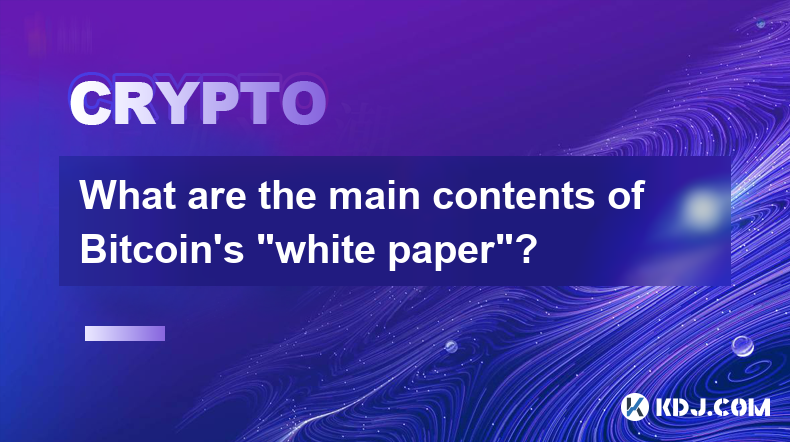
What are the main contents of Bitcoin's "white paper"?
Feb 21,2025 at 04:36am
Key Points:Understanding Bitcoin's Genesis: The White Paper's IntroductionA Decentralized Digital Currency: Bitcoin's Core ConceptBlockchain Technology: The Foundation of Bitcoin's Immutable LedgerProof-of-Work: Securing Bitcoin's NetworkThe Design of Bitcoin's Currency: Issuance, Scarcity, and DivisibilityBitcoin's Potential Applications and Future Pro...
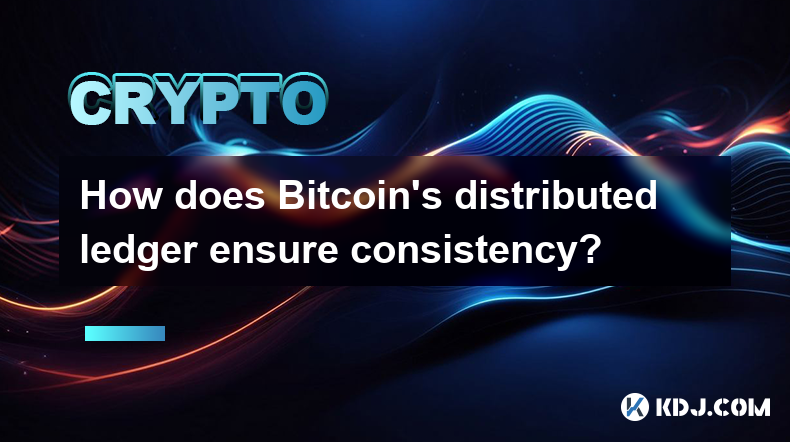
How does Bitcoin's distributed ledger ensure consistency?
Feb 22,2025 at 10:06pm
Key Points:Bitcoin employs a distributed ledger, also known as a blockchain, to maintain a tamper-proof and consistent record of transactions.The blockchain is a decentralized network of computers that collectively validate and store transaction data.Bitcoin's distributed ledger ensures consistency through consensus mechanisms and cryptographic algorith...
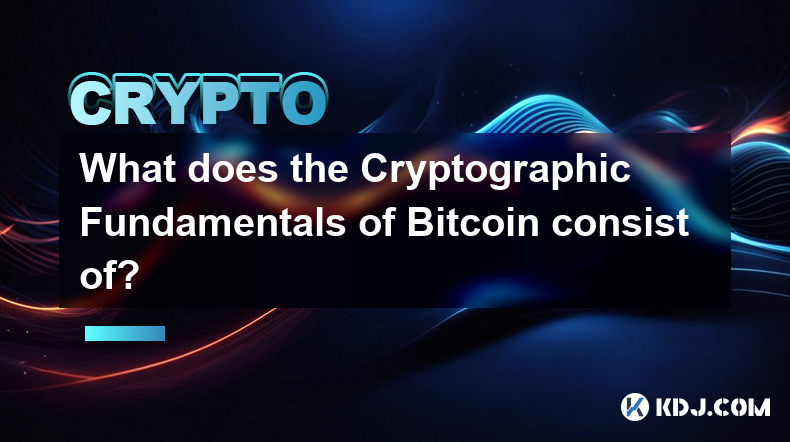
What does the Cryptographic Fundamentals of Bitcoin consist of?
Feb 21,2025 at 12:06pm
Key PointsUnderstanding the cryptographic algorithms used in BitcoinFamiliarization with the Bitcoin blockchain and its underlying mechanicsExamination of the security measures that protect Bitcoin from attackAnalysis of the decentralized nature of Bitcoin and its implicationsDiscussion of the scalability and transaction fee issues associated with Bitco...
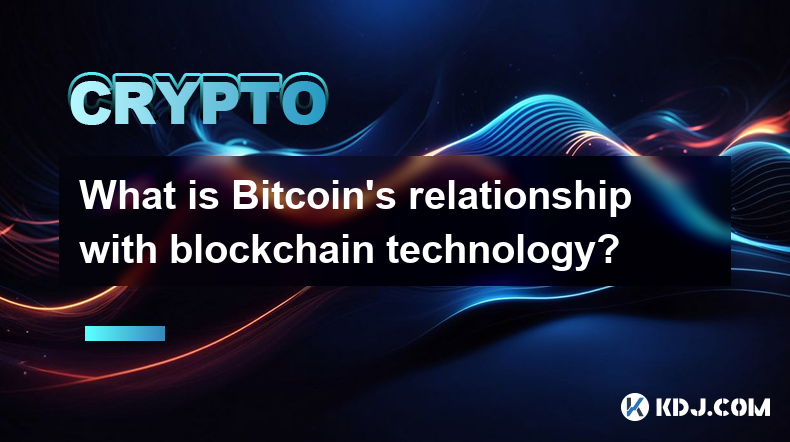
What is Bitcoin's relationship with blockchain technology?
Feb 22,2025 at 07:00pm
Bitcoin's Intertwined Relationship with Blockchain TechnologyKey Points:Definition of blockchain technology and its decentralized natureBitcoin's utilization of blockchain for secure and immutable transactionsThe role of blockchain in verifying and confirming transactionsEvolution of blockchain technology beyond Bitcoin's cryptocurrency applicationsUnde...
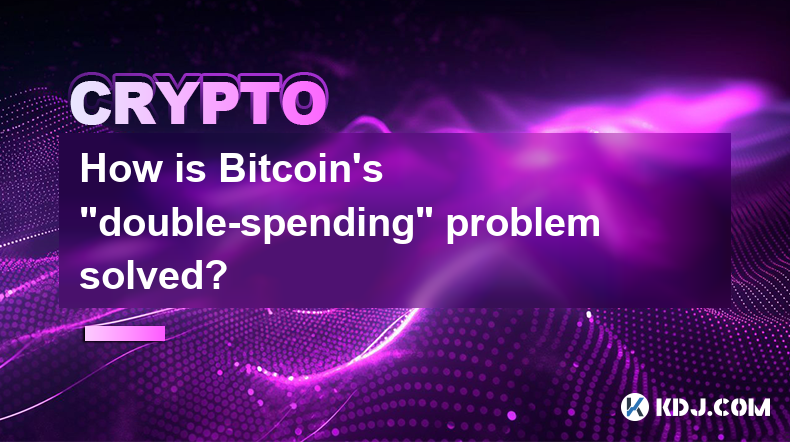
How is Bitcoin's "double-spending" problem solved?
Feb 23,2025 at 02:54am
Key Points:The double-spending problem refers to the potential for a digital currency transaction to be reversed, allowing the same funds to be spent multiple times.Bitcoin solves this problem through the use of a decentralized blockchain, a public ledger that records all transactions permanently and securely.The immutability and transparency of the blo...

What are the long-term investment risks of Bitcoin?
Feb 22,2025 at 05:30pm
Key PointsVolatility and price fluctuationsRegulatory uncertaintySecurity risksCompetition from altcoinsMarket manipulation and scamsTransaction feesEnvironmental concernsLong-Term Investment Risks of BitcoinVolatility and Price FluctuationsBitcoin's high volatility is a double-edged sword. While it has the potential to generate substantial returns, it ...

What are the main contents of Bitcoin's "white paper"?
Feb 21,2025 at 04:36am
Key Points:Understanding Bitcoin's Genesis: The White Paper's IntroductionA Decentralized Digital Currency: Bitcoin's Core ConceptBlockchain Technology: The Foundation of Bitcoin's Immutable LedgerProof-of-Work: Securing Bitcoin's NetworkThe Design of Bitcoin's Currency: Issuance, Scarcity, and DivisibilityBitcoin's Potential Applications and Future Pro...

How does Bitcoin's distributed ledger ensure consistency?
Feb 22,2025 at 10:06pm
Key Points:Bitcoin employs a distributed ledger, also known as a blockchain, to maintain a tamper-proof and consistent record of transactions.The blockchain is a decentralized network of computers that collectively validate and store transaction data.Bitcoin's distributed ledger ensures consistency through consensus mechanisms and cryptographic algorith...

What does the Cryptographic Fundamentals of Bitcoin consist of?
Feb 21,2025 at 12:06pm
Key PointsUnderstanding the cryptographic algorithms used in BitcoinFamiliarization with the Bitcoin blockchain and its underlying mechanicsExamination of the security measures that protect Bitcoin from attackAnalysis of the decentralized nature of Bitcoin and its implicationsDiscussion of the scalability and transaction fee issues associated with Bitco...

What is Bitcoin's relationship with blockchain technology?
Feb 22,2025 at 07:00pm
Bitcoin's Intertwined Relationship with Blockchain TechnologyKey Points:Definition of blockchain technology and its decentralized natureBitcoin's utilization of blockchain for secure and immutable transactionsThe role of blockchain in verifying and confirming transactionsEvolution of blockchain technology beyond Bitcoin's cryptocurrency applicationsUnde...

How is Bitcoin's "double-spending" problem solved?
Feb 23,2025 at 02:54am
Key Points:The double-spending problem refers to the potential for a digital currency transaction to be reversed, allowing the same funds to be spent multiple times.Bitcoin solves this problem through the use of a decentralized blockchain, a public ledger that records all transactions permanently and securely.The immutability and transparency of the blo...
See all articles

















































































